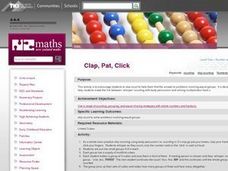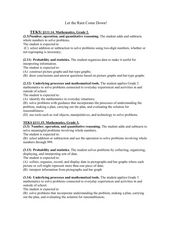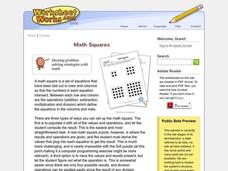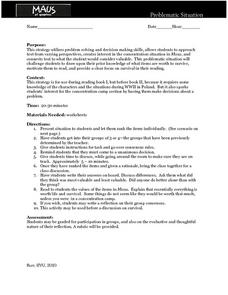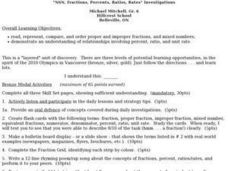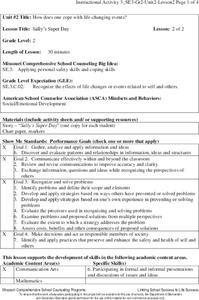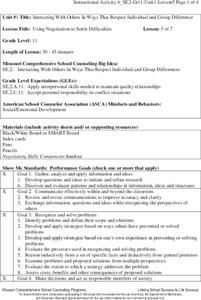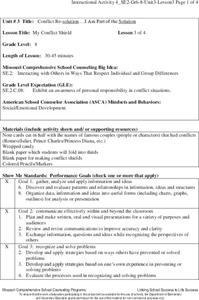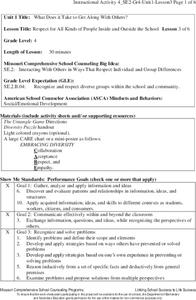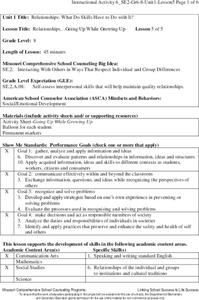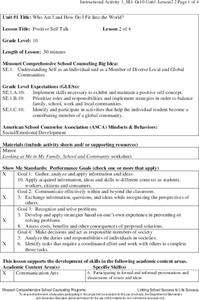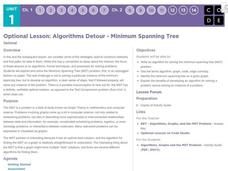Curated OER
Well,Well!
Second graders explore and solve a math word problem that involves a series of single digit additions and subtractions. They brainstorm ways to solve the problem, independently solve the problem using drawings, and discuss the various...
Curated OER
Chocolate Math
Students practice solving math equations by analyzing chocolate recipe measurements. In this chocolate baking math lesson, students read about the Hershey factory and recipes used to create chocolate bars. Students solve problems and...
Curated OER
What Begins With Bb?
Students demonstrate beginning reading strategies. In this letter recognition lesson plan, students match letter sounds to a variety of pictures using the program "Kidspiration".
Curated OER
Understanding Whole Numbers
In this understanding whole numbers worksheet, 4th graders use a computer program for instruction, then answer 16 problems about addition and subtraction.
Curated OER
Turning the Tables: A Guide to Devising Your Own Story
Students observe and demonstrate how to decipher and organize the information in a math word problem and apply mathematical concepts to different story problems. They discuss the parts of a story problem, and write their own original...
Curated OER
Clap, Pat, Click
First graders practice the art of skip counting to help them find the answer to problems involving equal groups. They are encouraged to make the link between "whisper" counting with body percussion and solving multiplication facts.
Curated OER
Let the Rain Come Down!
Second graders construct a bar graph comparing local precipitation to that of the Yucatan. In this graphing instructional activity, 2nd graders will use conversions and problem solving strategies.
Curated OER
Math Squares
For this math squares worksheet, students problem solve a variety of equations intersected by rows and columns involving addition, subtraction, division and multiplication equations.
Curated OER
Maus: Problematic Situation Strategy
Do people really need “a newer, bigger Holocaust” in order to change? Or is it possible that by making text-to-self connections to the stories of others people that they can change? In order to connect to Art Spiegelman’s Maus, class...
Curated OER
The Learning Book
First graders identify, comprehend, and evaluate the content and artistic aspects of oral and visual presentations. Then they participate in formal and informal presentations and discussions of issues and ideas. Students also create...
Novelinks
The Book Thief: The Power and Influence of Words
To culminate a study of Markus Zusak's The Book Thief, individuals craft a persuasive essay in which they assume the voice of a member of one of the political parties during the early 1920s, and advocate that their party offers the best...
Curated OER
"NSN, Fractions, Percents, Ratios, Rates" Investigations
Sixth graders engage in an investigation about the concepts related to fractions. They read, represent, compare, and order proper and improper fractions, and mixed numbers. They demonstrate an understanding of relationships involving...
Missouri Department of Elementary
Sally’s Super Day
After having a bad day, Sally took scholars' suggestions and had a super day. Pupils listen to her newest short story then discuss the events that occurred. They sort each event by what was in her control and what was not. Participants...
Missouri Department of Elementary
Using Negotiation to Settle Difficulties
Negotiating can be a win/win experience if the involved parties apply the skills and techniques offered in a lesson about negotiating to settle differences.
Missouri Department of Elementary
My Conflict Shield
As an exercise in self-awareness and improvement, class members create a Conflict Shield listing 12 skills they believe are the most useful in conflict resolution. They then color the ones they have mastered while leaving uncolored those...
Missouri Department of Elementary
Respect for All Kinds of People Inside and Outside the School
Why is it important to embrace diversity? Scholars explore the topic by learning about the CARE acronym: Collaboration, Acceptance, Respect, Empathy. They also complete a diversity puzzle worksheet and play a collaborative game that...
Buffalo State
Adding and Subtracting Positive and Negative Integers
A well-rounded unit on positive and negative integers is a great addition to your middle school math class. Learners work through five activities, each focused on a different skill, before playing a Game of Life to practice the...
Missouri Department of Elementary
Relationships…Going Up While Growing Up
The final activity in a series of five that focus on developing the interpersonal skills required to develop and maintain positive relationships asks class members to identify their best friend-making skill. Individuals share these...
Missouri Department of Elementary
Tic Tac Toe, Get Off My Toes
Why is conflict resolution such an important skill to learn? Pupils explore the topic, playing an adapted Tic-tac-toe game. Two class teams are tasked with finding a win-win solution to a hypothetical conflict before adding their X or O...
Missouri Department of Elementary
Community Wellness Fair
Seniors work with teachers, counselors, and administrators to organize a community wellness fair. Committees take on the responsibility for the various tasks (publicity, set up, hospitality room, agency contact, thank you letters, etc.)....
Missouri Department of Elementary
Fatal Accident
While there may not be any ghostbusters in the neighborhood, there are plenty of emergency response agencies ready to give support if something is amiss. To that end, instructors invite a member of an emergency response agency to address...
Missouri Department of Elementary
Assessing Self-Concept
A "My Self-Concept Report Card" worksheet launches a lesson about the importance of positive self-talk. After completing the worksheet, individuals make a list of the things they would do to improve or maintain a positive self-concept.
Missouri Department of Elementary
Positive Self Talk
Mirror, mirror. Hook sophomores into the benefits of positive self-talk with a lesson that asks them to reflect on the roles they play at home, at school, and in their communities. Class members fill out a “Looking At Me In My...
Code.org
Algorithms Detour - Minimum Spanning Tree
This optional activity introduces the class to the idea of a minimum spanning tree. The activity focuses on determining an algorithm that will find the most efficient path in a network to transfer data.
Other popular searches
- Problem Solving Strategies
- Problem Solving Strategies
- Problems Solving Strategies
- Ten Problem Solving Strategies







